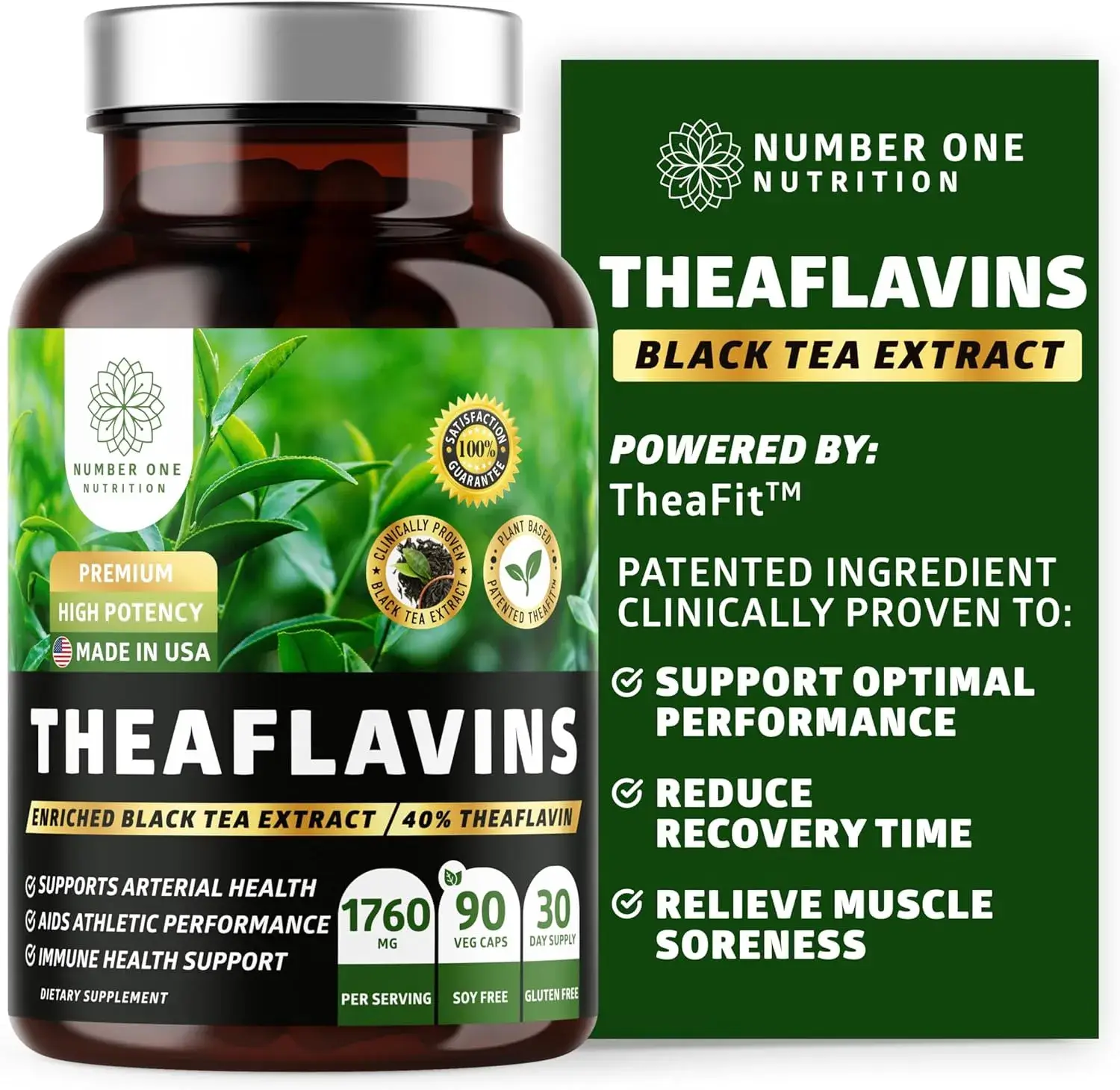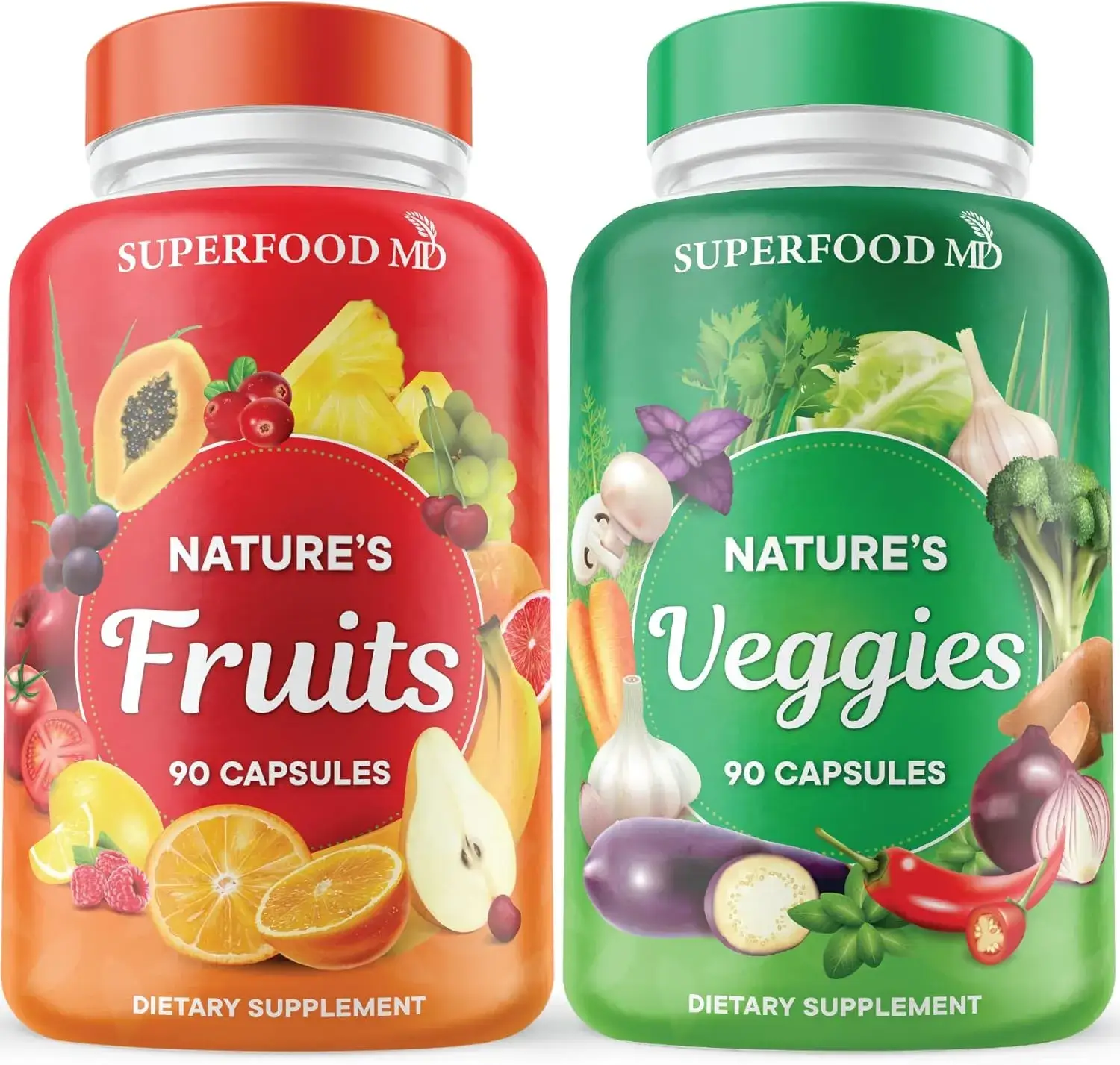Table of Contents
Thinking about making your own fruit tea? It’s a pretty simple process, and you can really get creative with it. Whether you’re using fresh fruit or dried pieces, the base tea you choose makes a big difference in the final taste. Let’s break down what tea is used for fruit tea and how different fruits can liven up your cup.
Key Takeaways
- Black tea offers a strong flavor that holds up well to fruity additions, making it a good choice for robust fruit teas.
- Green tea provides a lighter, refreshing base that complements delicate fruits and adds a touch of zest.
- Herbal teas are a great caffeine-free option, allowing the fruit flavors to be the main star.
- Citrus fruits like lemon and lime add brightness and zest, while berries offer a sweet and tart balance.
- Stone fruits and pome fruits such as peaches and apples contribute subtle sweetness and body to fruit tea blends.
Choosing The Right Tea Base For Fruit Infusions
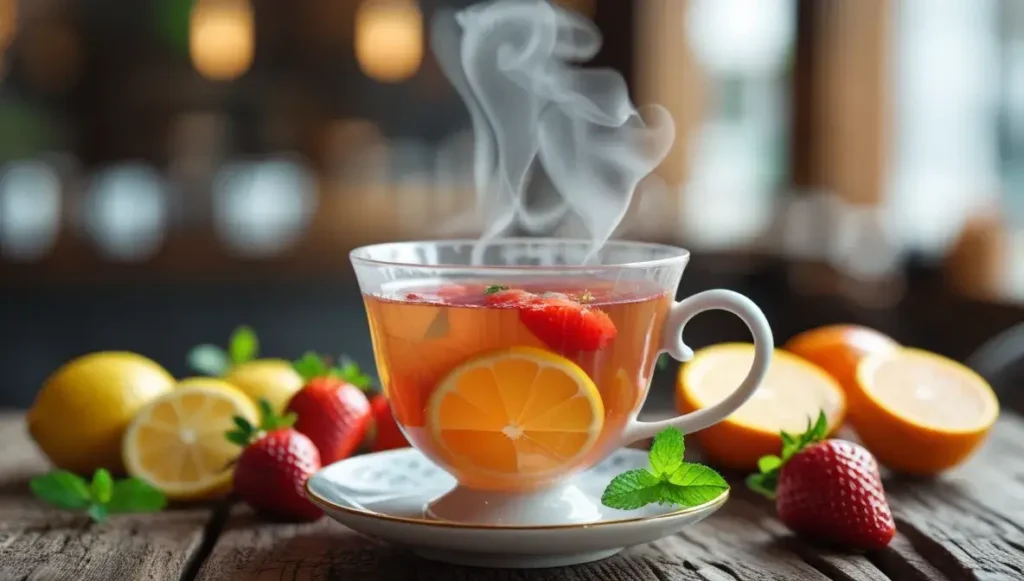
When you’re thinking about making fruit tea, the base tea you pick really matters. It’s not just about the fruit; the tea itself brings its own flavor and character to the mix. Getting this right is key to a delicious fruit drink. So, what are the best tea bases for fruit infusions?
Black Tea’s Robust Flavor Profile
Black tea is a popular choice for fruit tea recipes, and for good reason. Its strong, often malty flavor can stand up to even the boldest fruits without getting lost. Think of pairing a rich black tea with something like mango or berries; the tea provides a solid foundation that complements the fruit’s sweetness and tartness. It’s also quite forgiving, meaning you don’t have to stress too much about over-steeping, which is great if you’re new to this. For a more intense flavor, black tea is definitely a top contender among popular tea bases for fruit tea recipes.
Green Tea’s Refreshing Qualities
If you’re aiming for a lighter, more refreshing fruit tea, green tea is your go-to. Its delicate, sometimes grassy notes are perfect for pairing with lighter fruits like citrus, melon, or kiwi. Green tea has a subtle flavor that won’t overpower the fruit, allowing the fruit’s natural taste to shine through. Just be a little careful with brewing times and temperatures, as green tea can become bitter if brewed too hot or for too long. It’s a fantastic option for a cool, invigorating summer drink.
Herbal Teas as a Caffeine-Free Option
Don’t forget about herbal teas! These are technically not ‘tea’ in the traditional sense, as they don’t come from the Camellia sinensis plant, but they make wonderful bases for fruit drinks. Many herbal blends, like hibiscus or rooibos, already have fruity or floral notes that pair beautifully with added fruits. Plus, they’re naturally caffeine-free, making them a great choice for any time of day or for those sensitive to caffeine. If you’re looking for a caffeine-free option, exploring the world of herbal teas is a must for your fruit tea recipe tea selection.
Citrus Fruits For A Zesty Kick
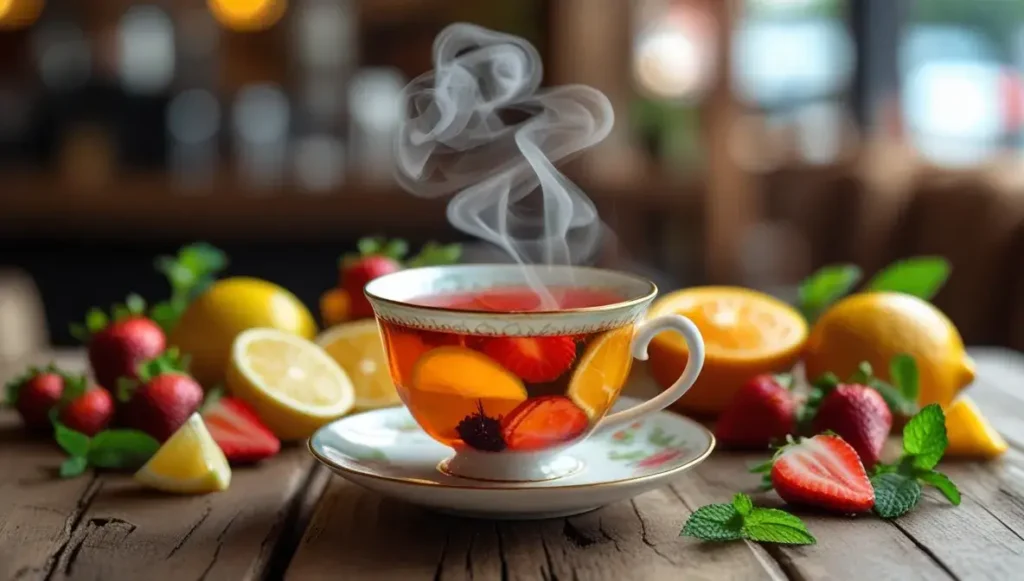
When you’re thinking about fruit teas, citrus fruits are pretty much a no-brainer. They bring this bright, zesty flavor that just wakes everything up. Plus, they’re packed with Vitamin C, which is always a good thing, right?
The Versatility of Lemon
Lemon is a total classic for a reason. You can just slice it up and toss it into hot or cold water, and it instantly makes it more refreshing. It’s got that perfect balance of tart and bright. If you’re making a bigger batch of fruit tea, a few lemon slices can really cut through any sweetness and add a nice zing. Some people even dry out lemon peels to add a slightly more concentrated, zesty note to their blends. It’s just so adaptable.
Lime’s Tropical Appeal
If you want to take your fruit tea in a more tropical direction, lime is your go-to. It’s similar to lemon but has this subtle, almost exotic vibe. Pairing lime slices with a black tea, like Earl Grey, is a combination I really enjoy, especially when it’s served over ice on a warm day. It adds a different kind of brightness than lemon, a bit more of a summery feel.
Orange’s Subtle Fragrance
Oranges bring a milder sweetness and a lovely aroma to fruit teas. They’re not as intensely sour as lemons or limes, so they work well to add a gentle fruity note without overpowering other flavors. Sliced oranges can add a pleasant sweetness and a boost of Vitamin C. They’re great for balancing out sharper fruits or adding a touch of natural sweetness to your brew. You can even use a bit of orange juice concentrate in a larger batch for a more pronounced flavor.
Citrus fruits are fantastic for adding a refreshing quality to your tea. Their natural acidity can brighten up the overall flavor profile, making the drink more invigorating. It’s a simple way to add a lot of character without needing a lot of extra ingredients.
👉 Discover the premium fruit tea experience your taste deserves 👈
Berry Blends For Tart Sweetness
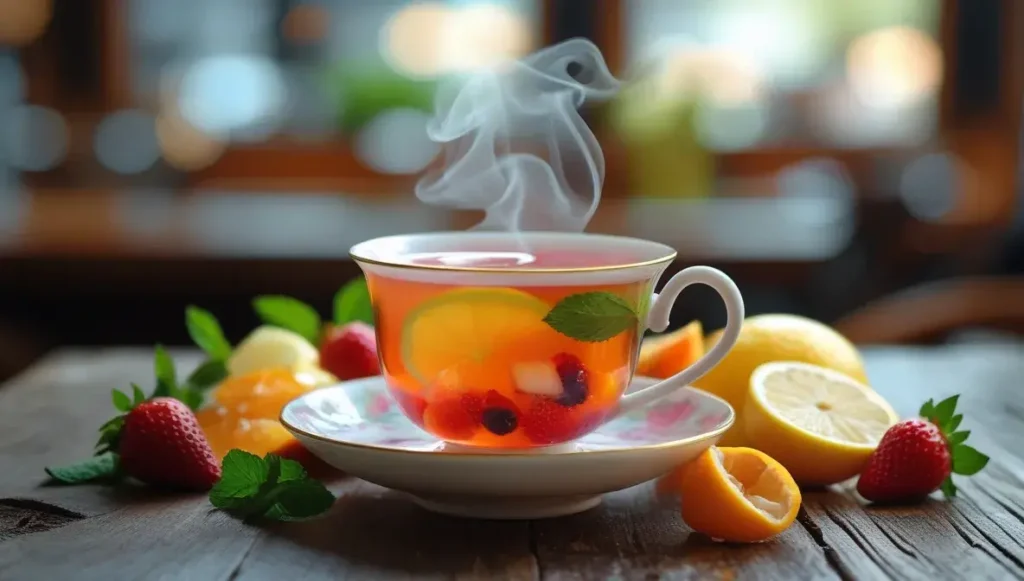
When you think about fruit teas, berries often come to mind. They bring a lovely tartness that can really wake up your taste buds, and they look pretty great in a glass too.
Summer Berries’ Delicate Nature
Think raspberries, blackberries, and strawberries. These guys are fantastic for adding a bright, slightly sour note to your tea. Just a heads-up, though: they can break down pretty quickly once they hit hot water. If you’re using fresh berries, you might want to pour your finished tea through a fine sieve to catch any tiny seeds or bits of skin. It makes for a smoother drink.
Cranberry’s Unique Tartness
Cranberries are a bit different. They’re not naturally sweet, and can even be a little drying on the palate if you eat them straight. That’s exactly why they work so well in tea! When you brew them, especially with something a bit sweeter like orange slices or a malty black tea, they add this really interesting tartness that balances everything out. It’s a popular choice, especially around the holidays, but honestly, it’s good any time of year.
Elderberry’s Earthy Notes
Elderberries are smaller and have a more earthy flavor compared to the brighter summer berries. You might not find these at your average grocery store, but they can often be bought dried online. They have a unique taste that can add a different kind of depth to your fruit tea, especially if you’re looking for something a little less common. They pair well with other robust flavors.
Stone Fruits And Pome Fruits
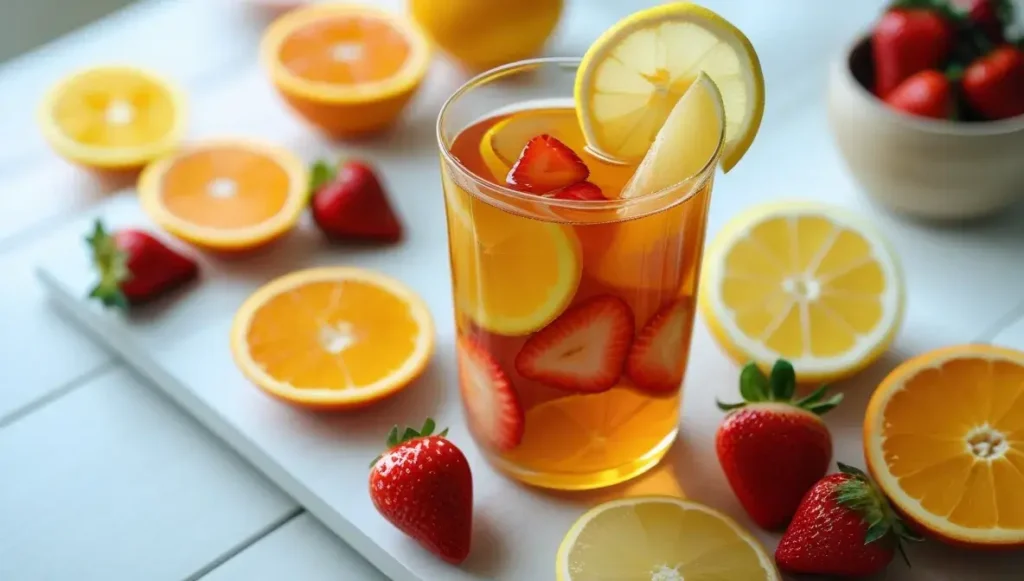
When you’re thinking about fruit teas, apples and peaches really come to mind. They’re pretty common, right? Apples bring this subtle sweetness that doesn’t overpower anything else. They’re crisp, too, which is a nice texture in a drink. You can slice them up thin or even dice them small. They kind of smooth out the sharper flavors from other fruits you might add, making the whole tea taste better, I think. It’s a good way to get a refreshing drink, especially on a warmer afternoon.
Peaches are a whole different story. They’ve got this really sweet flavor, almost like candy. When they’re ripe, they’re soft and smell amazing. Adding peaches to your tea gives it a really nice, sweet taste and a bit of a thicker feel. They’re great for making the tea feel more substantial and, well, just tastier.
And then there’s melon. Melons are super mild and sweet, with a light smell. They’re perfect for fruit tea because they add sweetness without being too much. They make the tea feel really refreshing. Usually, you cut melon into little cubes or thin slices. It gives the tea a nice, soft texture that’s easy to drink.
Apple’s Subtle Sweetness
Apples are great for fruit tea because their sweetness isn’t in your face. They have a fresh, crisp texture that’s really pleasant. Using apples can help balance out stronger fruit flavors, making your tea smoother and more enjoyable. It’s a simple way to add a nice touch to your drink.
Peach’s Candy-Like Flavor
Peaches offer a really sweet taste, almost like candy, especially when they’re perfectly ripe. They have a soft texture and a wonderful smell that makes any fruit tea more appealing. Adding peaches can give your tea a richer flavor and a slightly thicker consistency.
Melon’s Cooling Sensation
Melons are known for their mild sweetness and refreshing quality. They don’t have a strong flavor, so they blend well with other fruits and teas. Their cooling sensation makes them a good choice for a thirst-quenching drink, and they add a pleasant, soft texture.
Picking the right fruit is key. Look for fruit that feels firm, smells good, and has bright, even colors. Avoid anything with bruises or soft spots, as that usually means it’s past its prime and won’t taste as good in your tea.
👉 Sip the award-winning fruit tea crafted for elite flavors 👈
Tropical Fruits For Exotic Blends
When you want to take your fruit tea to a more adventurous place, tropical fruits are the way to go. They bring these really unique, vibrant flavors that you just don’t get from your everyday apples and berries. Think bright, sunny tastes that can really transport you. Plus, many of these fruits are loaded with good stuff like vitamins and antioxidants, so you’re not just drinking something tasty, you’re doing your body a favor too.
Passion Fruit’s Distinct Sourness
Passion fruit is a real standout in the tropical fruit world. It’s got this intense, tangy flavor that’s super refreshing, but it’s not overwhelmingly sour. It adds a really interesting zing to fruit tea that cuts through sweetness nicely. You usually want to use the pulp and seeds, maybe even a little juice, to get the full effect. It pairs surprisingly well with lighter teas like green tea, or even some herbal blends, creating a drink that’s both invigorating and complex.
Dragon Fruit’s Antioxidant Richness
Dragon fruit, also known as pitaya, is visually stunning with its bright pink or white flesh speckled with tiny black seeds. Flavor-wise, it’s pretty mild, often described as a subtle blend of kiwi and pear. This makes it a great team player in fruit teas, as it doesn’t overpower other ingredients. What makes dragon fruit really special is its high antioxidant content, which is great for your health. It adds a lovely texture and a gentle sweetness, making your fruit tea both pretty and beneficial.
Mango’s Sweet Aroma
Mango is practically synonymous with tropical sweetness. It has this rich, almost candy-like flavor and a fragrance that’s just intoxicating. When you add mango to your fruit tea, it brings a luscious texture and a deep, satisfying sweetness. It works wonderfully with bolder tea bases like black tea, where its strong flavor can really shine. Whether you use fresh mango chunks or a bit of mango puree, it’s sure to make your fruit tea feel like a special treat.
Other Fruit Tea Enhancements
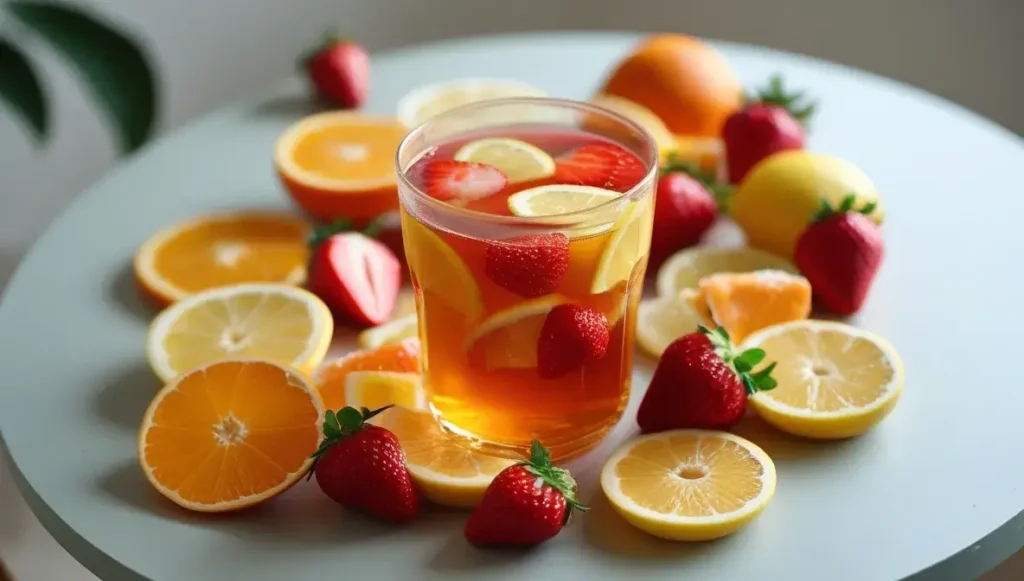
Sometimes, you want to add a little something extra to your fruit tea creations, beyond the usual suspects. Grapes, kiwi, and watermelon are fantastic for this. They bring unique textures and flavors that can really make your fruit tea pop.
Grapes for Sweetness and Texture
Grapes are a surprisingly good addition to fruit tea recipes. They offer a natural sweetness and, depending on whether you use them whole or halved, can add a fun little burst of flavor and texture. Red or black grapes tend to be sweeter, while green ones can add a touch of tartness. They’re great for adding a bit of body and a pleasant chewiness to your drink. When you’re thinking about tea types for fruity drinks, don’t overlook how grapes can complement a lighter tea base, like a delicate green tea for fruit flavored beverages.
Kiwi’s Tangy and Invigorating Taste
Kiwi brings a really bright, tangy flavor that’s super refreshing. Whether you go with the classic green kiwi or the sweeter golden variety, it adds a lively kick. It’s one of those fruits that just wakes up your taste buds. If you’re making fruit tea with different teas, kiwi pairs wonderfully with green tea for fruit beverage recipes, creating a vibrant and invigorating mix. It’s a great way to add a bit of zing without being too overpowering.
Watermelon’s Refreshing Sweetness
Watermelon is the ultimate thirst quencher, and it brings that same cooling sweetness to your fruit tea. It has a very mild flavor, so it won’t compete with your tea base or other fruits, but it adds a lovely subtle sweetness and a watery texture that’s just perfect for hot days. Think of it as a natural sweetener and hydrator all in one. It’s a simple way to make your fruit tea feel extra special and cooling, especially when you’re looking for tea leaves for fruit tea recipes that are light and refreshing.
When making fruit tea, remember that the goal is balance. You want the fruit flavors to complement the tea, not overpower it. Experimenting with different tea leaves for fruit flavored tea can open up a whole new world of delicious possibilities.
Wrapping Up: What Tea Is Used for Fruit Tea Adventure
So, there you have it! Making your own fruit tea is pretty straightforward, and you can really mix and match to find what you like best. Whether you’re starting with a simple lemon slice or going all out with berries and black tea, the possibilities are endless. Don’t be afraid to experiment with different fruits and teas to discover your perfect cup. It’s a great way to stay hydrated and enjoy some tasty flavors, all while controlling what goes into your drink. Happy brewing!
👉 Indulge in the superior fruit tea blend everyone craves 👈
Frequently Asked Questions
What kind of tea works best for fruit tea?
You can use black tea for a strong flavor, green tea for a refreshing taste, or herbal teas if you want to avoid caffeine. All of them can make a tasty fruit tea base.
Can I use fresh fruit to make fruit tea?
Absolutely! You can chop up fresh fruits like lemons, apples, or berries and steep them in hot water. Just remember to strain out the pieces before drinking.
What are some good fruits to use in fruit tea?
Citrus fruits like lemons and oranges add a zesty flavor. Berries give a nice tartness, while apples and peaches offer a gentle sweetness. Tropical fruits like mango and passion fruit bring exotic tastes.
Is fruit tea healthy?
When you make fruit tea with real fruit and avoid added sugars, it can be a healthy choice. It’s hydrating and can provide vitamins and antioxidants, especially if you use green tea.
How long should I brew fruit tea?
Unlike regular tea, fruit tea is pretty flexible. You can brew it for as long as you like and with water at any temperature. Just steep it until it tastes good to you!
Can I mix different fruits in my tea?
Definitely! Mixing fruits is a great way to create unique flavors. For example, try combining berries with orange or apple with cinnamon for a delicious blend.
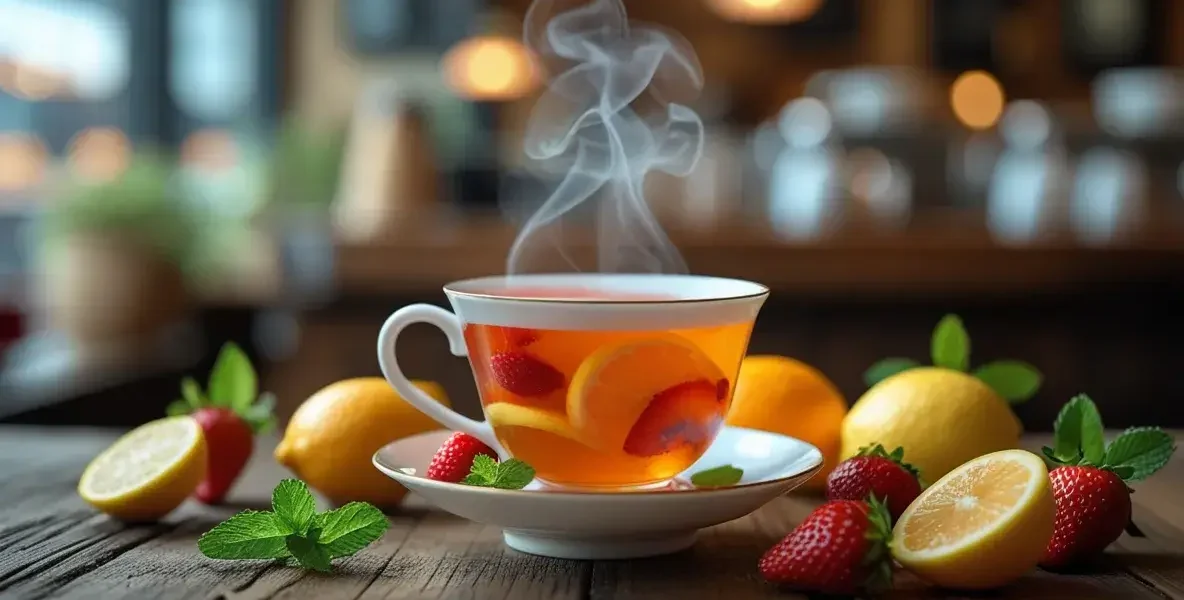




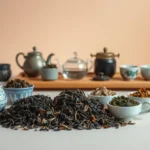



![Jasmine Tea vs Green Tea Benefits: Which Gives Better Health Results? [2025] jasmine tea vs green tea benefits](https://www.goteaworld.com/wp-content/uploads/2025/09/jasmine-tea-vs-green-tea-benefits-150x150.webp)


